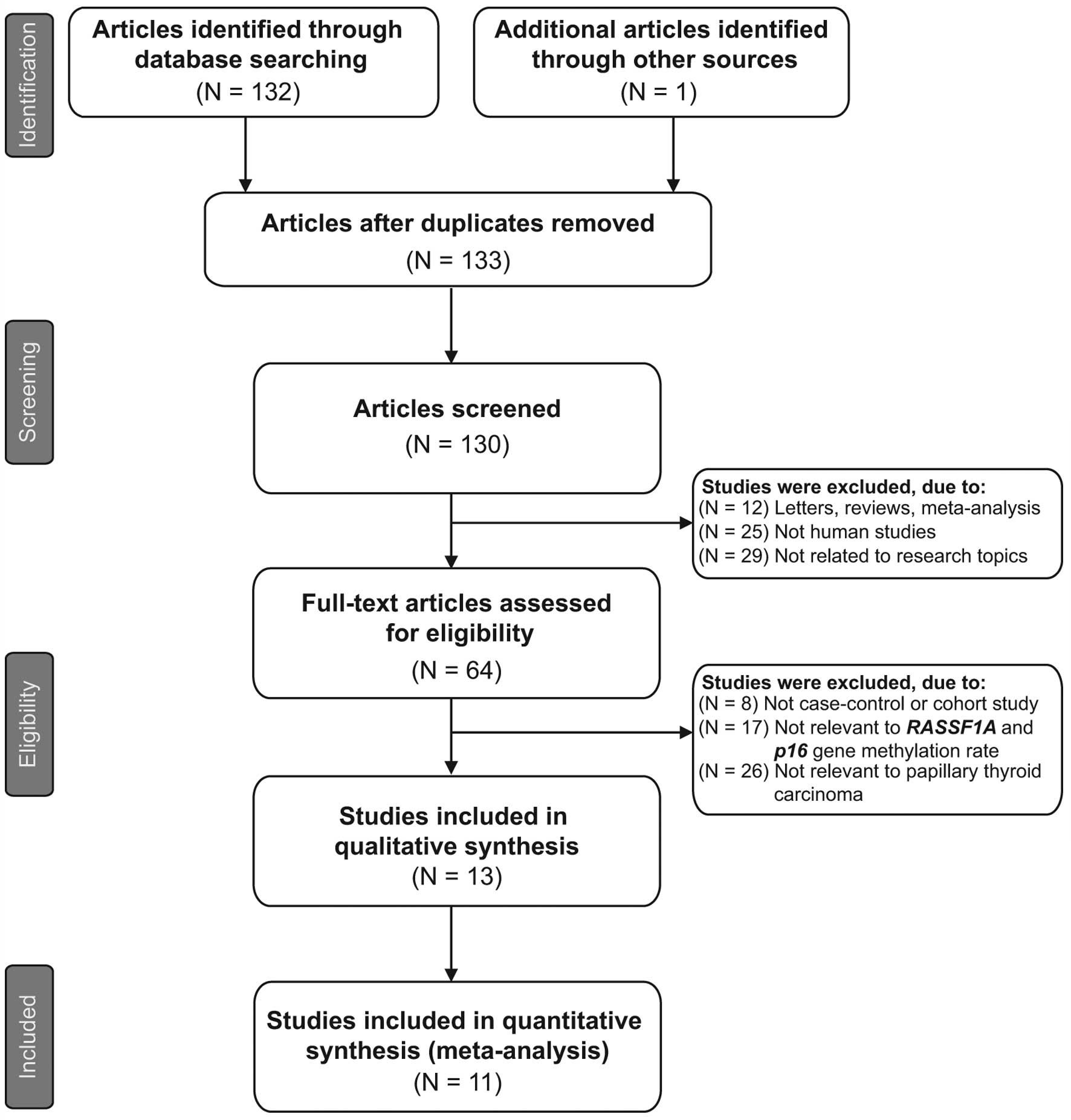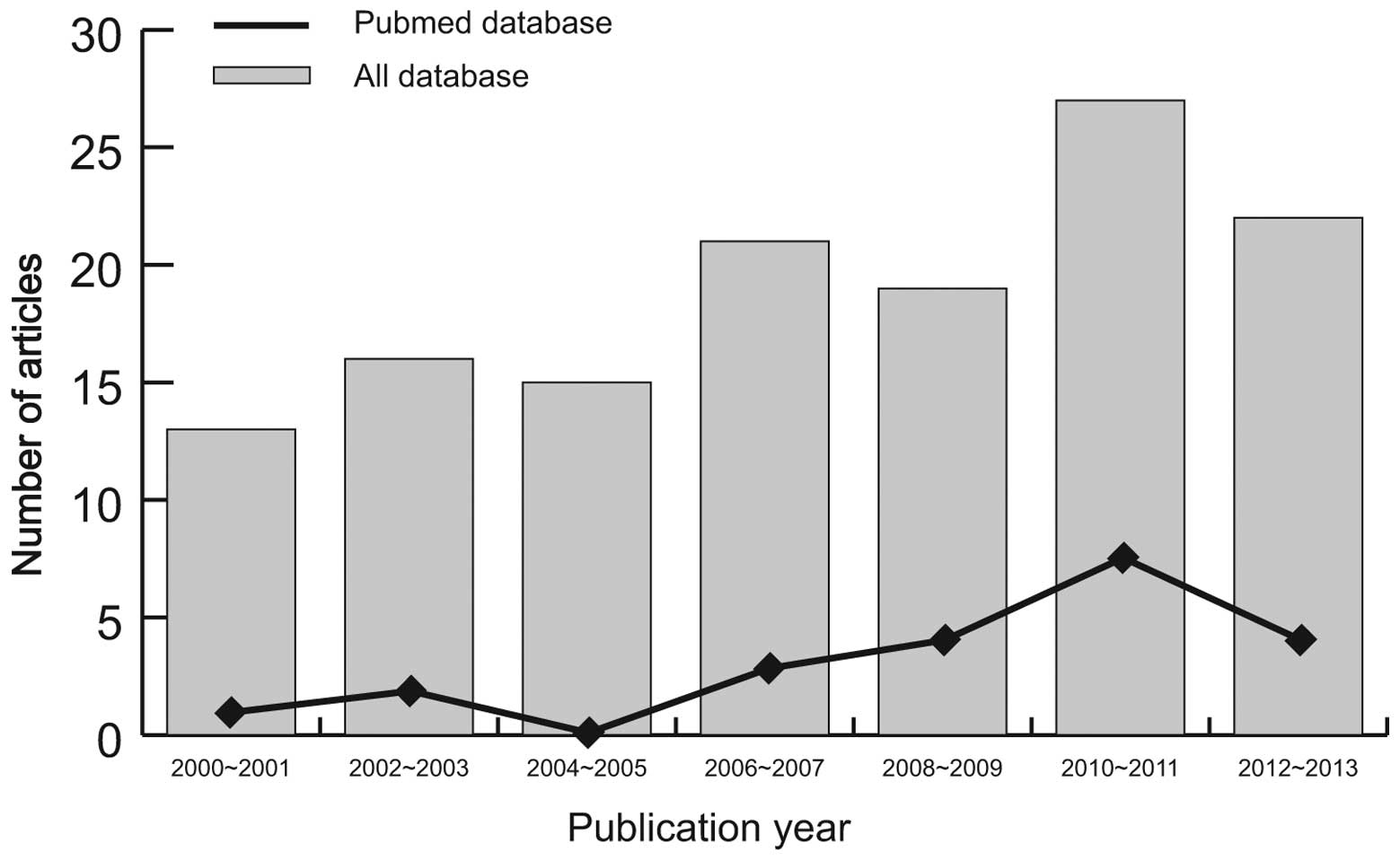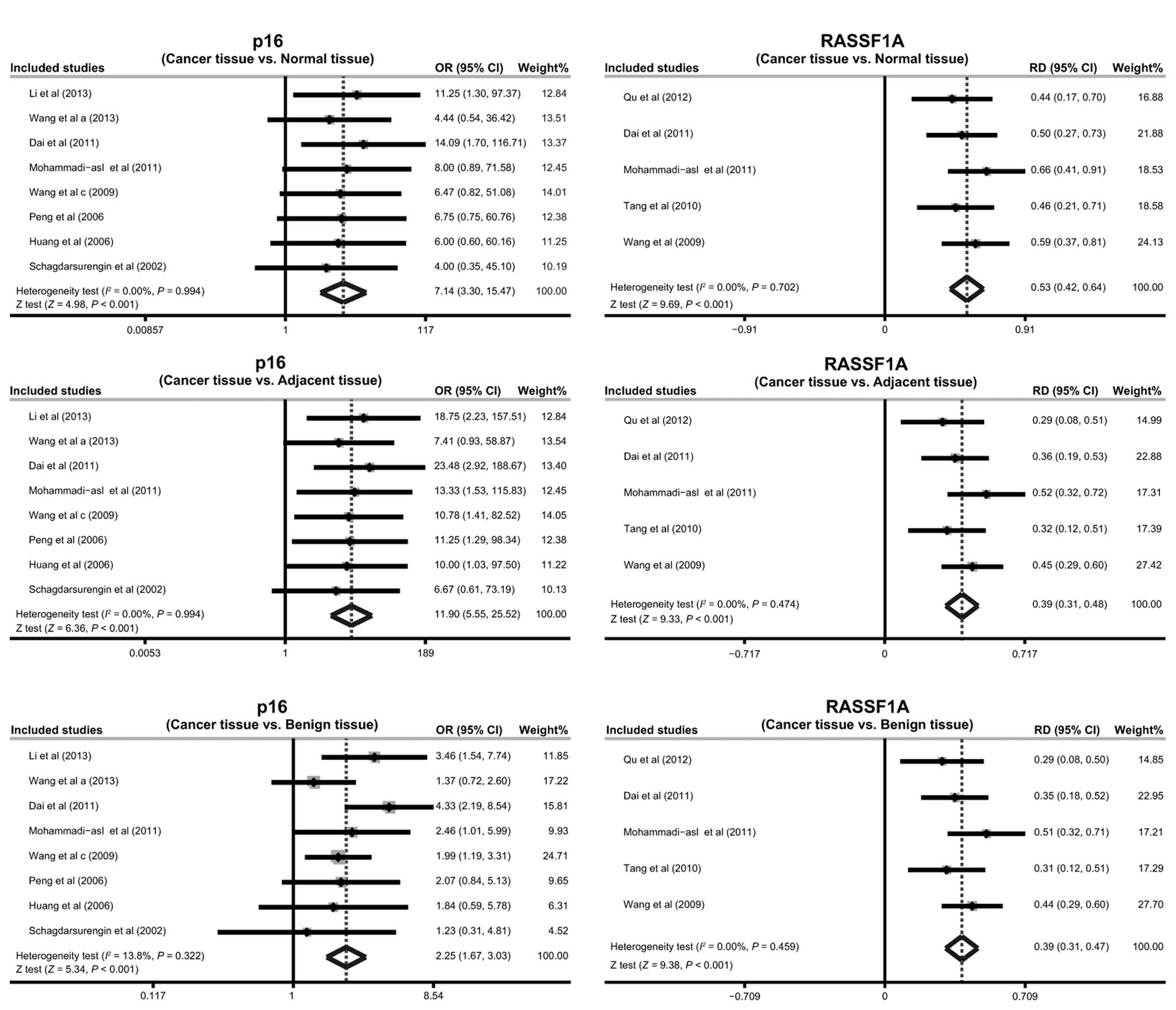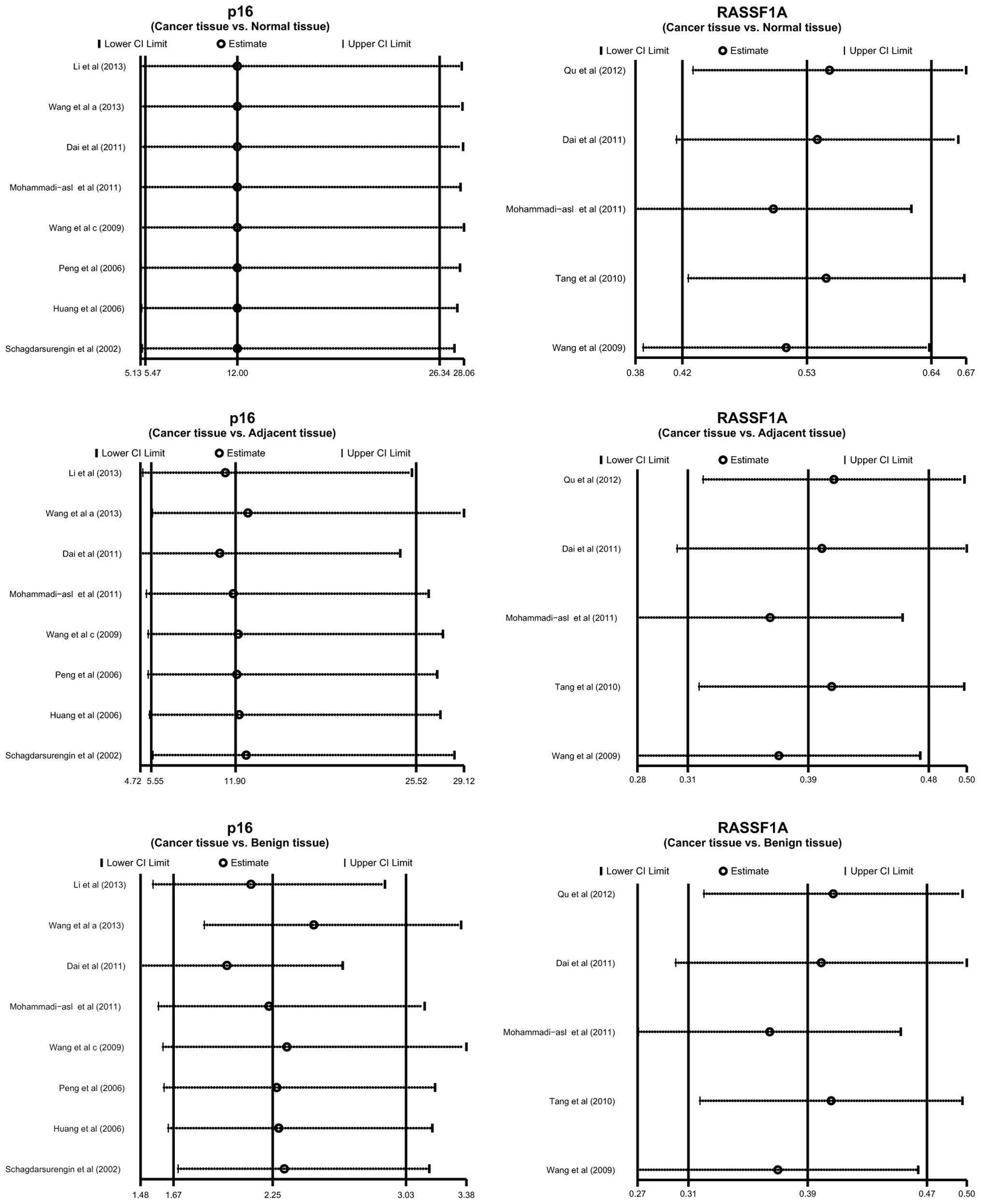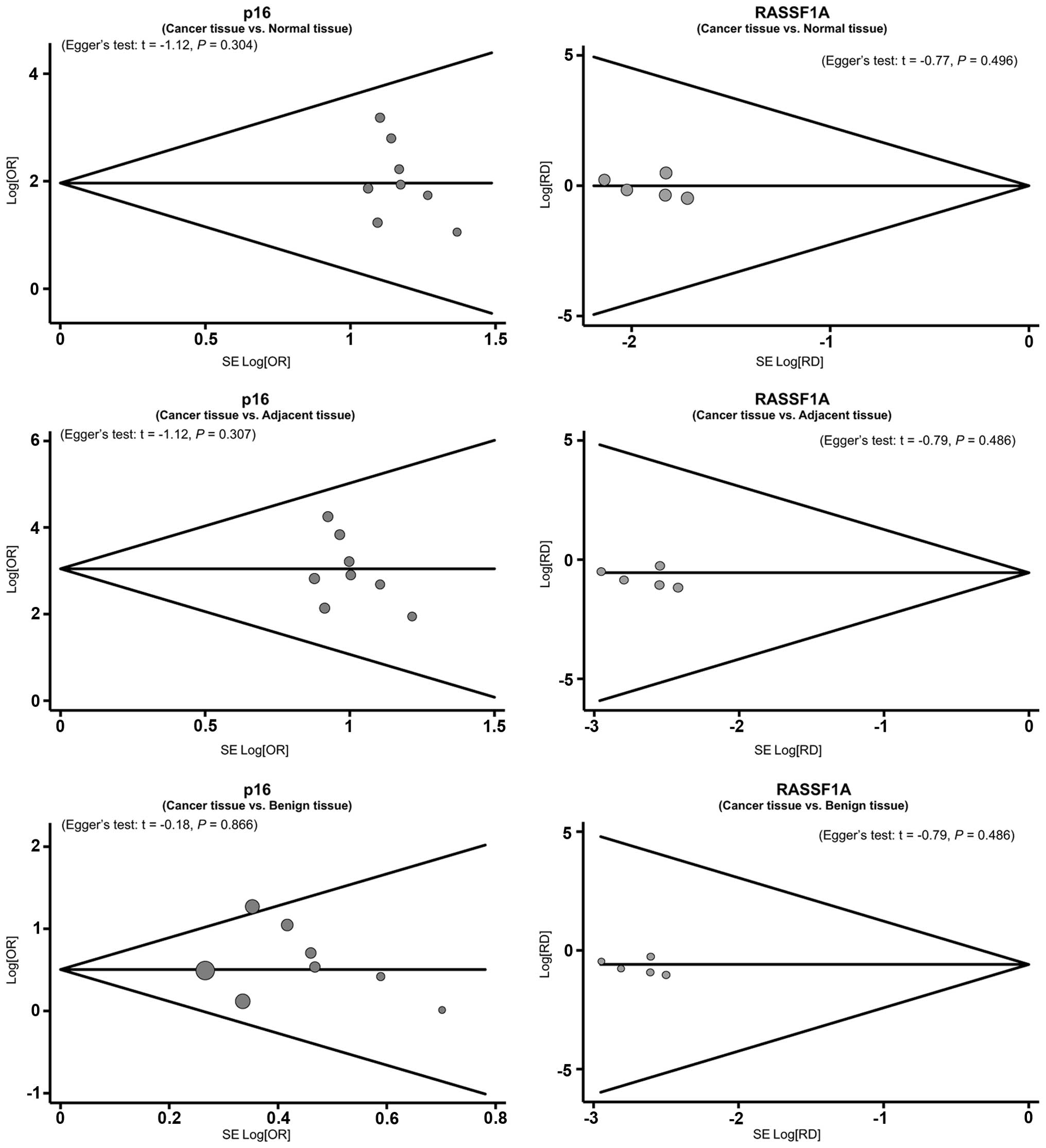|
1
|
Sipos JA and Mazzaferri EL: Thyroid cancer
epidemiology and prognostic variables. Clin Oncol (R Coll Radiol).
22:395–404. 2010. View Article : Google Scholar : PubMed/NCBI
|
|
2
|
Swierniak M, Wojcicka A, Czetwertynska M,
et al: In-depth characterization of the microRNA transcriptome in
normal thyroid and papillary thyroid carcinoma. J Clin Endocrinol
Metab. 98:E1401–E1409. 2013. View Article : Google Scholar : PubMed/NCBI
|
|
3
|
Jonklaas J, NoguerasGonzalez G, Munsell M,
et al: The impact of age and gender on papillary thyroid cancer
survival. J Clin Endocrinol Metab. 97:E878–E887. 2012. View Article : Google Scholar : PubMed/NCBI
|
|
4
|
LiVolsi VA: Papillary thyroid carcinoma:
an update. Mod Pathol. 24 (Suppl 2):S1–S9. 2011. View Article : Google Scholar : PubMed/NCBI
|
|
5
|
Hughes DT, Haymart MR, Miller BS, Gauger
PG and Doherty GM: The most commonly occurring papillary thyroid
cancer in the United States is now a microcarcinoma in a patient
older than 45 years. Thyroid. 21:231–236. 2011. View Article : Google Scholar : PubMed/NCBI
|
|
6
|
Enewold L, Zhu K, Ron E, et al: Rising
thyroid cancer incidence in the United States by demographic and
tumor characteristics, 1980–2005. Cancer Epidemiol Biomarkers Prev.
18:784–791. 2009. View Article : Google Scholar : PubMed/NCBI
|
|
7
|
Detours V, Delys L, Libert F, et al:
Genome-wide gene expression profiling suggests distinct radiation
susceptibilities in sporadic and post-Chernobyl papillary thyroid
cancers. Br J Cancer. 97:818–825. 2007. View Article : Google Scholar : PubMed/NCBI
|
|
8
|
Xing M: Prognostic utility of BRAF
mutation in papillary thyroid cancer. Mol Cell Endocrinol.
321:86–93. 2010. View Article : Google Scholar : PubMed/NCBI
|
|
9
|
Mohammadiasl J, Larijani B, Khorgami Z, et
al: Qualitative and quantitative promoter hypermethylation patterns
of the p16, TSHR, RASSF1A and RARβ2 genes in papillary thyroid
carcinoma. Med Oncol. 28:1123–1128. 2011. View Article : Google Scholar : PubMed/NCBI
|
|
10
|
Kunstman JW, Korah R, Healy JM, Prasad M
and Carling T: Quantitative assessment of RASSF1A methylation as a
putative molecular marker in papillary thyroid carcinoma. Surgery.
154:1255–1261. 2013. View Article : Google Scholar : PubMed/NCBI
|
|
11
|
AbouZeid AA, Azzam AZ and Kamel NA:
Methylation status of the gene promoter of cyclin-dependent kinase
inhibitor 2A (CDKN2A) in ovarian cancer. Scand J Clin Lab Invest.
71:542–547. 2011. View Article : Google Scholar : PubMed/NCBI
|
|
12
|
Shidham VB, Mehrotra R, Varsegi G, et al:
p16INK4a immunocytochemistry on cell blocks as an
adjunct to cervical cytology: Potential reflex testing on specially
prepared cell blocks from residual liquid-based cytology specimens.
Cytojournal. 8:12011. View Article : Google Scholar : PubMed/NCBI
|
|
13
|
LutfulKabir FM, Agarwal P, Deinnocentes P,
et al: Novel frameshift mutation in the p16/INK4A tumor suppressor
gene in canine breast cancer alters expression from the
p16/INK4A/p14ARF locus. J Cell Biochem. 114:56–66. 2013. View Article : Google Scholar : PubMed/NCBI
|
|
14
|
Rabien A, SanchezRuderisch H, Schulz P, et
al: Tumor suppressor p16 INK4a controls oncogenic K-Ras function in
human pancreatic cancer cells. Cancer Sci. 103:169–175. 2012.
View Article : Google Scholar : PubMed/NCBI
|
|
15
|
Kamb A, ShattuckEidens D, Eeles R, et al:
Analysis of the p16 gene (CDKN2) as a candidate for the chromosome
9p melanoma susceptibility locus. Nat Genet. 8:23–26. 1994.
View Article : Google Scholar : PubMed/NCBI
|
|
16
|
Wang P, Pei R, Lu Z, Rao X and Liu B:
Methylation of p16 CpG islands correlated with metastasis and
aggressiveness in papillary thyroid carcinoma. J Chin Med Assoc.
76:135–139. 2013. View Article : Google Scholar : PubMed/NCBI
|
|
17
|
Tian Y, Hou Y, Zhou X, Cheng H and Zhou R:
Tumor suppressor RASSF1A promoter: p53 binding and methylation.
PLoS One. 6:e170172011. View Article : Google Scholar : PubMed/NCBI
|
|
18
|
CunhaDda S, Simões MI, Viviani DN, et al:
Carotid artery rupture following radioiodine therapy for
differentiated thyroid carcinoma. Arq Bras Endocrinol Metabol.
55:419–425. 2011. View Article : Google Scholar : PubMed/NCBI
|
|
19
|
Gao T, Wang S, He B, et al: The
association of RAS association domain family Protein1A (RASSF1A)
methylation states and bladder cancer risk: a systematic review and
meta-analysis. PLoS One. 7:e483002012. View Article : Google Scholar : PubMed/NCBI
|
|
20
|
Dreijerink K, Braga E, Kuzmin I, et al:
The candidate tumor suppressor gene, RASSF1A, from human chromosome
3p21.3 is involved in kidney tumorigenesis. Proc Natl Acad Sci USA.
98:7504–7509. 2001. View Article : Google Scholar : PubMed/NCBI
|
|
21
|
Yee KS, Grochola L, Hamilton G, et al: A
RASSF1A polymorphism restricts p53/p73 activation and associates
with poor survival and accelerated age of onset of soft tissue
sarcoma. Cancer Res. 72:2206–2217. 2012. View Article : Google Scholar : PubMed/NCBI
|
|
22
|
Nakamura N, Carney JA, Jin L, et al:
RASSF1A and NORE1A methylation and BRAFV600E mutations in thyroid
tumors. Lab Invest. 85:1065–1075. 2005. View Article : Google Scholar : PubMed/NCBI
|
|
23
|
Dammann R, Schagdarsurengin U, Seidel C,
et al: The tumor suppressor RASSF1A in human carcinogenesis: an
update. Histol Histopathol. 20:645–663. 2005.PubMed/NCBI
|
|
24
|
vanVlodrop IJ, Niessen HE, Derks S, et al:
Analysis of promoter CpG island hypermethylation in cancer:
location, location, location! Clin Cancer Res. 17:4225–4231. 2011.
View Article : Google Scholar : PubMed/NCBI
|
|
25
|
Santoro A, Pannone G, Carosi MA, et al:
BRAF mutation and RASSF1A expression in thyroid carcinoma of
southern Italy. J Cell Biochem. 114:1174–1182. 2013. View Article : Google Scholar : PubMed/NCBI
|
|
26
|
Huang P, Li DX and Zhang Y: Methylation of
p16 gene and expression of p16 protein in human thyroid neoplasms.
J Practical Oncol. 21:49–51. 2006.(In Chinese).
|
|
27
|
Schagdarsurengin U, Gimm O, HoangVu C, et
al: Frequent epigenetic silencing of the CpG island promoter of
RASSF1A in thyroid carcinoma. Cancer Res. 62:3698–3701.
2002.PubMed/NCBI
|
|
28
|
Stang A: Critical evaluation of the
Newcastle-Ottawa scale for the assessment of the quality of
nonrandomized studies in meta-analyses. Eur J Epidemiol.
25:603–605. 2010. View Article : Google Scholar : PubMed/NCBI
|
|
29
|
Zintzaras E and Ioannidis JP: HEGESMA:
genome search meta-analysis and heterogeneity testing.
Bioinformatics. 21:3672–3673. 2005. View Article : Google Scholar : PubMed/NCBI
|
|
30
|
Peters JL, Sutton AJ, Jones DR, Abrams KR
and Rushton L: Comparison of two methods to detect publication bias
in meta-analysis. JAMA. 295:676–680. 2006. View Article : Google Scholar : PubMed/NCBI
|
|
31
|
Dai YL, Zhang F, Jiang ZR, et al:
Association the methylation of p16 and RASSF1A with papillary
thyroid carcinoma. Chin J Int Med. 50:428–429. 2011.
|
|
32
|
Li XF, Jin YL, He ZL and Gu DK: Detecting
the abnormal methylation of plasma p16 promoter in patients with
thyroid carcinoma by nested-methylation-specific polymerase chain
reaction. Chin J Prev Contr Chronic Dis. 21:34–36. 2013.(In
Chinese).
|
|
33
|
Peng ZL, Cao RX, Wen GB, Liu JH and Wen F:
The methylation of p16 gene in papillary thyroid carcinoma. J Mod
Oncol. 14:1501–1503. 2006.(In Chinese).
|
|
34
|
Qu F and Xue WJ: RASSF1A methylation and
its clinical roles in papillary thyroid carcinoma. J Nantong Univ
(Med Sci). 32:490–492. 2012.(In Chinese).
|
|
35
|
Tang JD and Su XL: Research of CpG island
methylation status of NIS and RASSF1A gene promoters in papillary
thyroid carcinomas. China J Mod Med. 20:3282–3285. 2010.(In
Chinese).
|
|
36
|
Wang C, Shi JH and Wang WY: Expressions of
p53 and p16 and their clinical significance in thyroid papillary
carcinoma. J Bengbu Med Col. 34:871–873. 2009.(In Chinese).
|
|
37
|
Wang XH, Zhang GC, Liu YL, et al:
Detecting the abnormal methylation of RASSF1A in patients with
thyroid carcinoma. Shaanxi Med J. 38:790–792. 2009.(In
Chinese).
|
|
38
|
Barroeta JE, Baloch ZW, Lal P, et al:
Diagnostic value of differential expression of CK19, Galectin-3,
HBME-1, ERK, RET, and p16 in benign and malignant
follicular-derived lesions of the thyroid: an immunohistochemical
tissue microarray analysis. Endocr Pathol. 17:225–234. 2006.
View Article : Google Scholar : PubMed/NCBI
|
|
39
|
Lam AK, Lo CY, Leung P, et al:
Clinicopathological roles of alterations of tumor suppressor gene
p16 in papillary thyroid carcinoma. Ann Surg Oncol. 14:1772–1779.
2007. View Article : Google Scholar : PubMed/NCBI
|
|
40
|
Boltze C, Zack S, Quednow C, et al:
Hypermethylation of the CDKN2/p16INK4A promotor in thyroid
carcinogenesis. Pathol Res Pract. 199:399–404. 2003. View Article : Google Scholar : PubMed/NCBI
|
|
41
|
Xing M, Cohen Y, Mambo E, et al: Early
occurrence of RASSF1A hypermethylation and its mutual exclusion
with BRAF mutation in thyroid tumorigenesis. Cancer Res.
64:1664–1668. 2004. View Article : Google Scholar : PubMed/NCBI
|
|
42
|
Fernandes MS, Carneiro F, Oliveira C and
Seruca R: Colorectal cancer and RASSF family - a special emphasis
on RASSF1A. Int J Cancer. 132:251–258. 2013. View Article : Google Scholar : PubMed/NCBI
|















